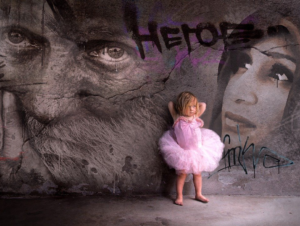Just Who Do You Think You Are?

One rainy day many years ago, while I was still in college, I was stomping along the street, resentful and annoyed, on the way to buy some milk since nobody at the house had even considered what happens when you use up the last few drops. Somehow, it always ended up being I who ran these little errands, and I was sick and tired of it. Suddenly, out of the blue, I heard a voice in my head say, “I am me.”
Wait, I thought and stopped walking. What does that even mean — I am me? I know that. Who else could I be? The words held vague overtones of self-awareness, integrity, and an elusive element of confidence that was just out of reach. If I could only grab hold of it, my life would change forever, or so I thought.
Eventually, as happens with most epiphanies, it faded into the background, resurrecting every so often when I found myself questioning my values.
In the fifty-plus years since that blinding (and admittedly confusing) insight, I still haven’t figured it out, but I think I’m coming closer to some kind of understanding.
Who Are You?
When we sit down to write our autobiography or a memoir of our life, we often forget to look at what this question means. We go on our merry way, recording all the stuff that happens, paying little or no attention to the reasons why we did those things, experienced those events or suffered those consequences.

When we’re young, as I was back then, we don’t think about who we are, or who we want to be when we grow up (I want to be my mother when I grow up—she was a wonderful, kind, generous, funny, loving person), but we don’t always, or even very often, think about what it is that makes us who we are. We just are who we are, and we don’t take it further than that.
But as we age, we begin to question our choices. We question the wisdom of our early responses and reactions and we make some effort to “be a better person”, often failing in the process, but there’s usually some attempt at self-improvement. Just look at the thousands of self-help books and courses out there.
Regardless of the success of our self-improvement attempts, experience and maturity tend to temper the excesses of our youth, and in any given situation, we fall back on the familiar way we’ve handled similar situations in the past. The person we’ve become has habitual methods to deal with it. We have a sense of “self” that determines our default behaviour.
Or have we?
Who Are You To Others?
Think about it. We are different people when we’re with different people. When you’re being presented to Queen Elizabeth, you’re not the same person you are when you’re potty-training a toddler. You’re a different person with your dog than you are with your boss. Your behaviour changes, your speech patterns change, the way you dress, your body language and facial expressions, even your emotional state is different in every case.

So why, when you write your memoir, do you try to write yourself as the same character in every scene?
Okay, maybe you don’t. Maybe you have enough sense of yourself as different people to change your written dialogue or inner monologue, but when you dig deep, how much of the genuine “you” is there in these written interactions?
Why Are You Different?
To answer that, we need to look at social conditioning, habit and motivation. We need to discover why we behave the way we do with the different individuals who are important to us.
I think in large part, it depends on how safe we feel with them. With children, pets and people we consider to be of lower social status, we feel in control. We feel as if we can handle the situation, so we move and speak with confidence.
But when faced with someone who is more powerful than we are, we behave more circumspectly because instinctively, we recognize that they hold greater power. That power doesn’t have to be physical (or physically augmented like a small man with a large weapon). It could be social status, money, age, intelligence, knowledge or simply a more confident behaviour and attitude.
Some of us have more confidence than others when placed in a given situation, and a lot of that has to do with the experiences we’ve lived through and the learning we’ve gained over the course of a lifetime, (although sometimes that confidence is completely misplaced, especially at the start of a project when we don’t yet know the type or extent of the problems we’ll face.) Confidence is built up over time as we encounter and overcome the challenges life throws at us. Our level of confidence depends on our experience and the habits we’ve developed to deal with them.
So Who Are You, Really?
How can you write about yourself with any degree of accuracy, when you’re so many different people?

When you write a scene from your childhood, are you writing as a child? Or are you writing as an adult, remembering being a child? Are you “telling” from the point of view of the adult you are now or are you “showing” the reader and helping him to live the experience from the point of view of the child you were then?
When you write about conflict, do you write about what happened? Or do you write about how you felt about what happened? Readers connect with emotion, and the more effectively you can convey that emotion, based on the character you were when the events happened, the more strongly your reader will feel what you felt and empathize with you as the character of your memoir.
Who Are You To Yourself?
When you write your life story (or portions of your personal history as you do in memoir), you must determine the point of view of the person you are at that point in your history. This applies to the memoir as a whole, but it also applies to each individual scene.
Your beliefs when you’re young are not the same as the beliefs you have as a senior. Your values, prejudices and opinions will vary wildly from childhood to old age. How often have you heard it said (and maybe you’ve said this yourself) “I wish I had the body and agility of a twenty-year-old, but with the wisdom and knowledge I have now”?
We grow, we learn, we develop, we mature (hopefully!) and we change. We transform, and it’s that transformation of character which is the point of every good story. It’s the lessons and realizations that make for a great character.
Who you are to yourself is the key to writing an honest, self-integral story. As mentioned earlier, you can use your inner monologues, descriptions of your body language and facial expressions, your reactions and behaviours to indicate to the reader who you really are inside. It’s your honesty and vulnerability about your feelings and emotions that give your story authenticity and make it compelling to your reader. Don’t be afraid to let readers feel your pain, experience your fears, embarrassments and failures, as well as your triumphs.
It’s change and growth that drive the narrative. It’s the comparison between who you are at the beginning of the story and who you are at the end of the story that satisfies your reader’s curiosity, and it’s your transformation that is the heart of your story.
Happy Writing!

Beverley Hanna
Trained as an artist in the late 1960’s and early 1970’s, I was one of the first creatives to be employed in the computer graphics industry in Toronto during the early 1980’s. For several years, I exhibited my animal portraiture in Canada and the U.S. but when my parents needed care, I began writing as a way to stay close to them. I’ve been writing ever since. I run a highly successful local writer’s circle, teaching the craft and techniques of good writing. Many of my students have gone on to publish works of their own. I create courses aimed at seniors who wish to write memoirs, with a focus on the psychology of creatives and the alleviation of procrastination and writer's block.
